1.Opening
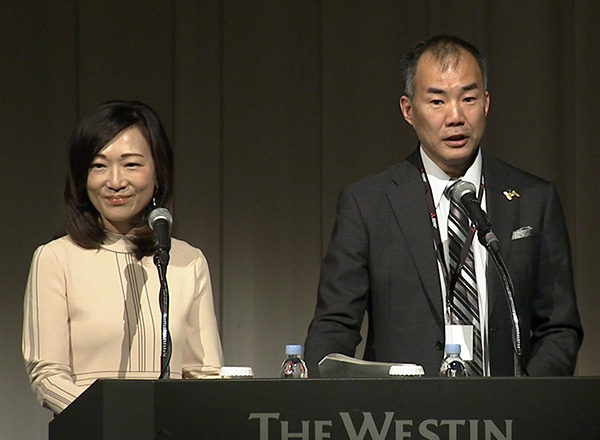
MCs - Mr, Soichi Noguchi, JAXA Astronaut, and Ms. Misuzu Onuki, CEO of Space Access - opened the conference.
2.Opening Remarks 1
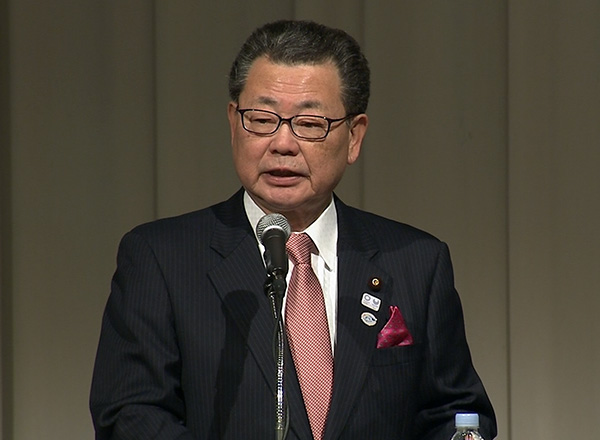
Representing the hosting organizations, Toshiei Mizuochi, State Minister of Education, Culture, Sports, Science and Technology, stressed that, for further development of space industries, the flexibility of the private sector and the further participation of non-space entities are strongly sought. This side event has a significant role in combination with the ministerial meeting scheduled for tomorrow.
3.Opening Remarks 2

Daisaku Hiraki, Parliamentary Vice-Minister of Economy, Trade and Industry, discussed that space exploration is no longer exclusively for governments but has become a closer matter the public with the expectation of economic ripple effects. The S-matching system that connects the companies wishing to start space business and the investors interested in space business.
4.Highlight Presentation 1
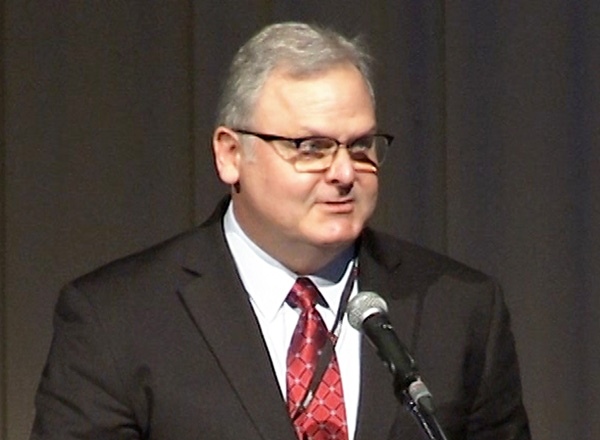
James H. Chilton, Senior Vice President, Boeing, spoked that the success of the International Space Station (ISS) Program owes greatly to the multinational cooperation. He discussed to use the ISS, which is in a matured stage, as a testbed for future space exploration and pointed out the need of both government-led and commercially-led programs for space eco system development.
5.Panel 1: Socioeconomic Conditions, Innovations & Space Exploration in 2030
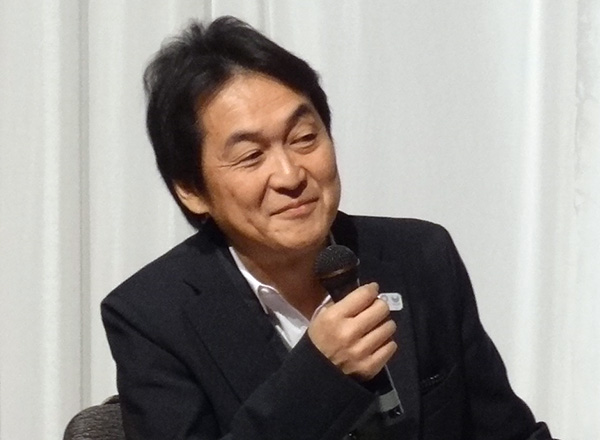
Moderator
Takeshi Natsuno
Guest Professor, Graduate School of Media and Governance, Keio University
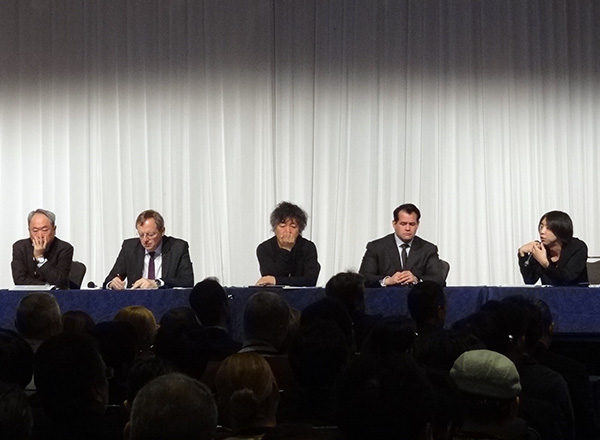
Panelists(Starting from the left)
Kazuhiko Toyama
Managing Partner, Industrial Growth Platform, Inc.
Johann-Dietrich Woerner
Director General, European Space Agency (ESA)
Kenichiro Mogi
Senior Researcher, Sony Computer Science Laboratories
Peter Marquez
Partner, Andart Global
Yoichi Ochiai
CEO, Pixie Dust Technologies, Inc.
Bruce B. Cahan, J.D.
Lecturer, Department of Management Science & Engineering, Stanford University
(Remote Participation)
Panel 1 discussed the values and possibilities of space exploration as an industry. Panelists expressed the opinions including below.
Space is an effective filed for technological innovation.
Space exploration should be conducted with clear purpose.
Both cooperation and competition are necessary for the growth of space industry.
6.Highlight Presentation 2

Mark N. Sirangelo, Executive Vice President, Sierra Nevada Corporation noted the importance of respecting the history including Space Shuttle Program. He introduced that United Nations selected Dream Chaser, the shuttle Sierra Nevada is developing, to offer space missions to emerging nations and many countries has indicated their desires to fly space missions.
7.Panel 2: Industrialization & Economic Effects of Lunar & Asteroid Development
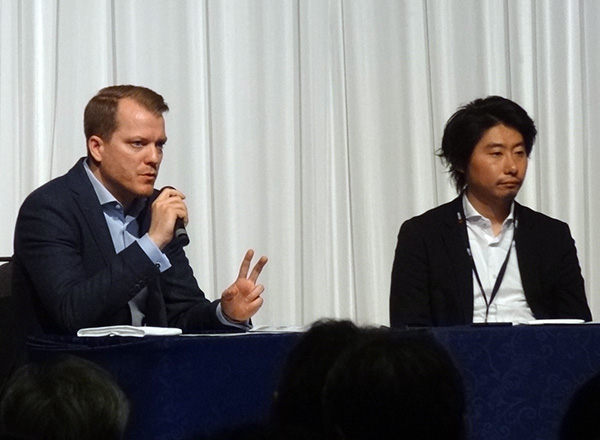
Moderator(On the far left in the picture below)
Chad Anderson
CEO, Space Angels
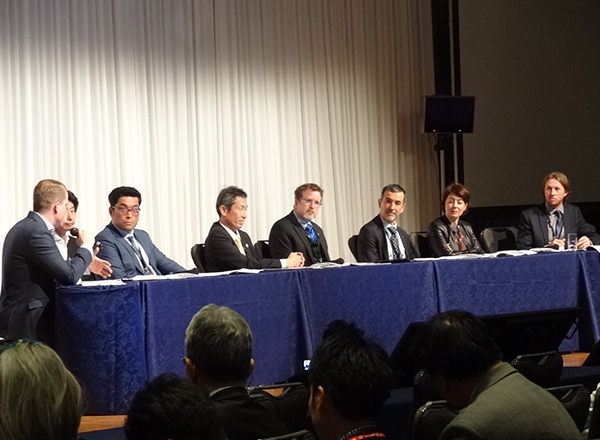
Panelists(Starting from the left)
Takeshi Hakamada
CEO & Founder, ispace
Tom Ochinero
Senior Director, Commercial Sales, SpaceX
Ko Ogasawara
Vice President & Director, General Manager, Business Development Department, Space Systems Division, Integrated Defense & Space Systems, Mitsubishi Heavy Industries, Ltd.
Rob Chambers
Director, Human Spaceflight Strategy and Business Development, Space Systems Company, Lockheed Martin
Cesare Lobascio
Space Infrastructure Systems Innovation Lead and Expert Life Support & Habitability, Thales Alenia Space Italia
Agata Jozwicka-Perlant
Head of Prospects & International Development, Future Programmes, ArianeGroup
Mike Lewis
Chief Technology Officer, NanoRacks LLC
Panel 2 discussed space business from the viewpoints of players and supporters. Panelists’ comments included below the role government in developing transportation to deep space the role of commercial companies in developing infrastructures other than transportation and generating demands the importance of legal framework and standardization.
8a.Sponsor Lunch Session A
8a-1.Boeing
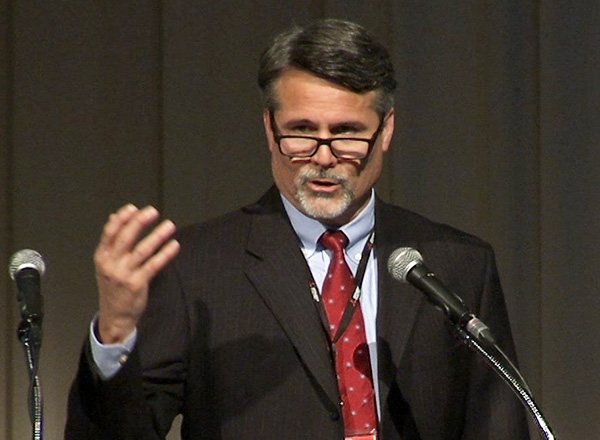
Mark Mulqueen, Program Manager, International Space Station, Space and Missile Systems, Boeing, stated that the ISS is the symbol of international cooperation and the inspiration to the future generations. He emphasized that the ISS can be utilized for demonstration of the technologies necessary for future space explorations and the ISS is fully capable of contributing as long as it is needed.
8a-2.Thales Alenia Space
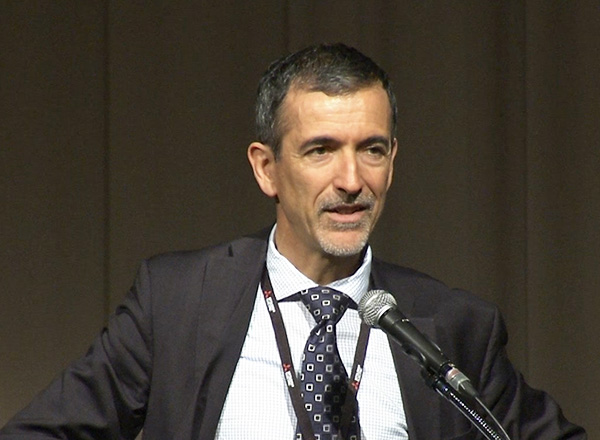
Cesare Lobascio, Space Infrastructure Systems Innovation Lead and Expert Life Support & Habitability, Thales Alenia Space, Italia said that Thales Alenia is aiming for efficient development by collaborating not only with conventional space companies, but also with large and small non-space companies, when utilizing the ISS for technological demonstration and engaging in other space development. He also expressed Thales Alenia’s interest in partnership with Japanese companies.
8b.Sponsor Lunch Session B
Outlook for Commercial Applications in the Low Earth Orbit and ISS with Looking at Space Exploration
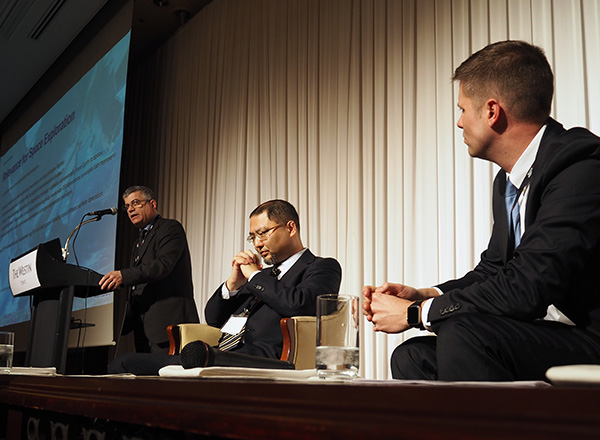
Moderator(Center in the picture below)
Naohiro Sato
Manager, Space System Innovation Group, Japan Manned Space Systems
Speakers(Starting from the left)
Carlo Mirra
Director, Space Products Sales, AIRBUS DS, Bremen – Germany
Christian Maender
Director, In-Space Manufacturing and Research, Axiom Space, LLC
Representatives from Airbus, Axiom Space, and JAMSS agreed that the keys to the success of manned LEO business include demand development, easy-to-use platform, cost reduction, and government purchase of commercial services. They also agreed that manned LEO commercialization would contribute to international space exploration, by proving that public and private partnership model can be applied to space exploration and concluded below, We are at the turning-point of manned space activities. It is essential to realize sustainable LEO economy to step forward to deep space exploration.
LEO now offers top rate business opportunities with commercial investments in space market in addition to government funding. Based on the experiences acquired through the ISS, we can pave the challenging path to develop LEO market.
8.Y-ISEF Report: Views Of Young Professionals
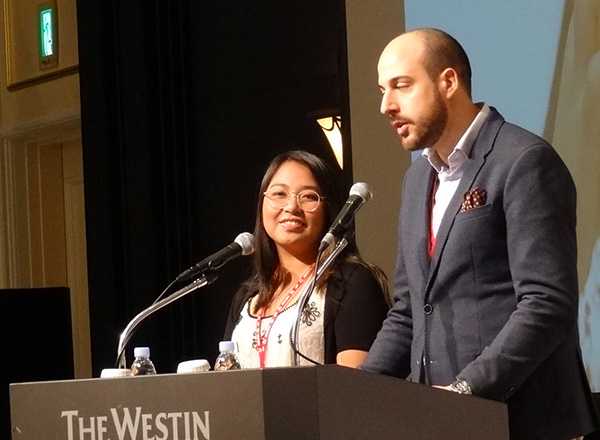
Speakers from the Winning Team
Francesco Spina
SES, Luxembourg
Catherine RKP Mandigma
University of the Philippines
The speakers form the Winning Team, the winner out of 10 Teams participated in Y-ISEF, presented their idea of producing meat (protein) called MYCOMEAT on orbit from fungi. This idea aims not only to solve nutrition issue of long space flights but also to apply solving the issues on the ground such as food and waste management. It also can be used to produce batteries, plastics, and propulsions.
9.Panel 3: Prospects of Space Exploration & Other Industries
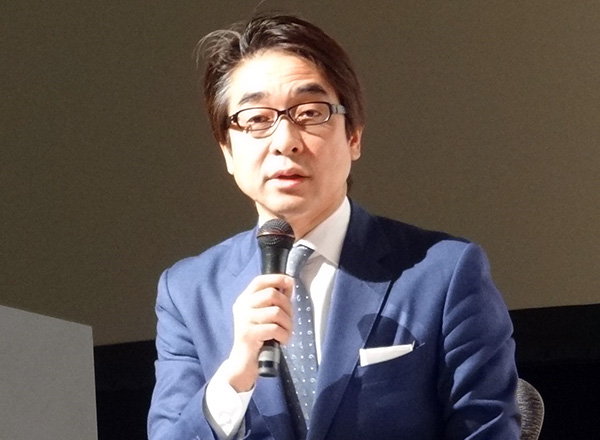
Moderator
Takaaki Umezawa
Japan Chairman, A.T. Kearney
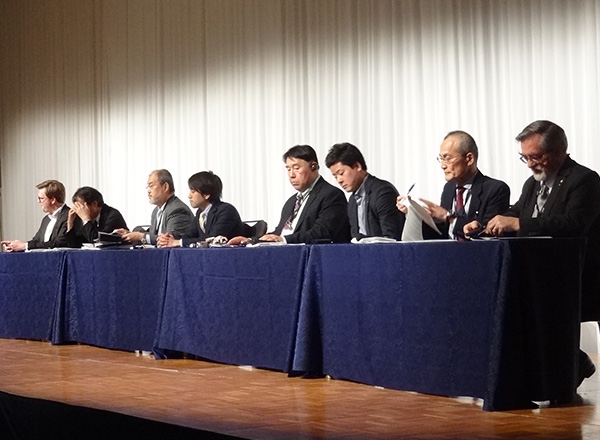
Panelists(Starting from the left)
Akira Fukabori
AVATAR Program Director, Digital Design Lab, ANA HOLDINGS INC.
Junichi Hosoi
Manager, Shiseido Global Innovation Center
John C. Mankins
Vice President, Moon Village Association
Hajime Onojima
Senior General Manager, Smart City Promotion Department, Technical Division, Obayashi Corporation
Andrew Rush
President & CEO, Made In Space
Tetsuya Sakuo
First-class registered architect, Member of the Board Managing Director, Misawa Homes Co., Ltd.
Junichi Sugahara
Director & Executive Officer, Spiber Inc.
Kimitaka Watanabe
Senior Specialist, R&D Group, TOMY Company, Ltd.
Panel 3 discussed the values and issues of space exploration business and the possibilities of collaboration with space exploration companies from the viewpoints of non-space industries. Panelists commented including below. Discuss commercially-led space exploration without relying on long-term investment from governments Raise public awareness by showing innovative technologies on the ground Accelerate entry into space businesses by promoting standardization and mass production Clearly explain the differences between the Earth and the Moon/Mars for conducting R&D and businesses.
10.Panel 4: Policy Measures for the Expansion of Space Exploration Businesses
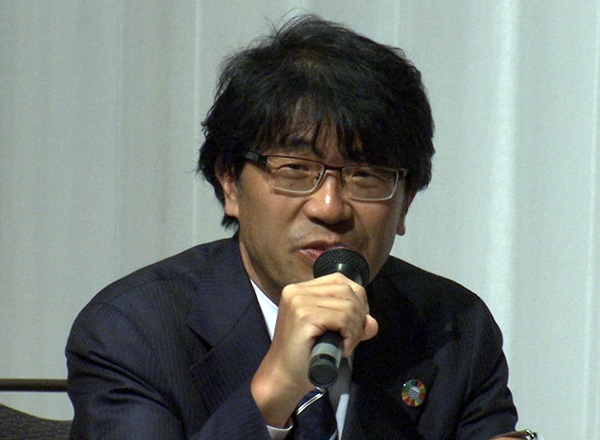
Moderator
Sunami Atsushi
Vice President, Professor, National Graduate Institute for Policy Studies (GRIPS)
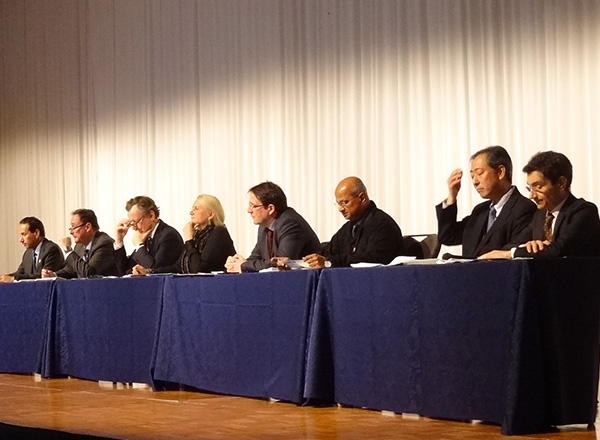
Panelists(Starting from the left)
Mohammed Nasser Al Ahbabi
Director General, United Arab Emirates Space Agency (UAESA)
Robert M. Lightfoot Jr.
Acting Administrator, National Aeronautics and Space Administration (NASA)
Roberto Battiston
President, Italian Space Agency (ASI)
Pascale Ehrenfreund
Chair of the Executive Board, German Aerospace Center (DLR)
Mario Grotz
Director, General for Research, Intellectual Property and New Technologies, Ministry of the Economy, Luxembourg
P.G. Diwakar
Scientific Secretary, Indian Space Research Organization (ISRO)
Hiroshi Yamakawa
Member of the Committee on National Space Policy
Silvio Sandrone
Vice President, Advanced Projects and Products, Airbus Defence and Space
Each panelist reported on the policies and activities his/her country has for promoting space exploration and developing space economy. Panel discussed on the roles of government and private sectors as well as the challenges and solutions in promoting space economy. Panel 4’s suggestions included below.
・Provide training to start-ups and provide incentives for new entries
・Develop ecosystem for space exploration
・Involve various industries by drawing commercial funds including venture capitals in addition to government funds
・Following the success of the ISS program, utilize international cooperation. NASA is leading the way in supporting challenges of private companies to develop LEO economy. The good example is Axiom/Airbus/JAMSS collaboration introduced in the Lunch Session on manned LEO business.
Panel also took up one of the questions from the audience, “For general public, what are the values of having lives on the Moon/Mars and economy?” and discussed “the importance is in how to generate values” and “how to inspire future generations.”
11.Remarks
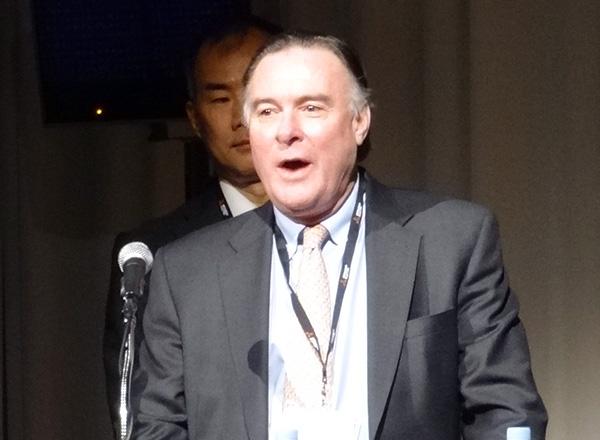
Representing the first ISEF host country, Kenneth Hodgkins, Director, Office of Space and Advanced Technology, U.S. Department of State took the podium and expressed appreciation to Japan for hosting the second ISEF.
12.Remarks
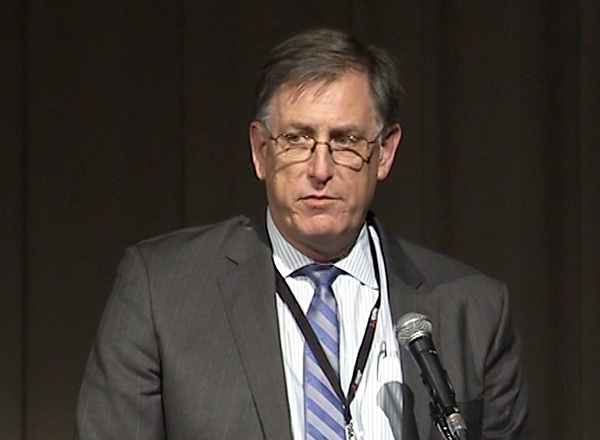
On behalf of an ISEF sponsor, American Institute of Aeronautics and Astronautics (AIAA), Daniel L. Dumbacher, Executive Director expressed appreciation to all participants for the successful conference.
13.Closing Remarks
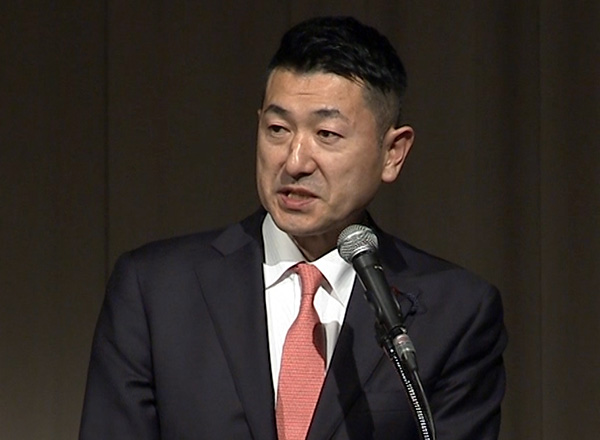
As a host, Jiro Akama, State Minister of Cabinet Office, delivered closing remarks, thanking for meaningful discussions made today and expressing expectations for fruitful discussion of tomorrow’s ministerial meeting.